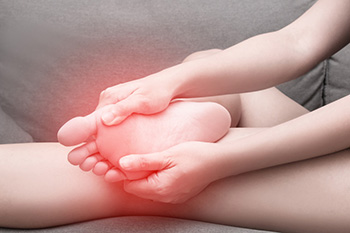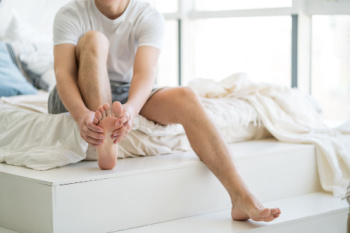Items filtered by date: May 2024
Common Foot Conditions

Our feet, the foundation of our mobility, can often fall victim to various ailments. Achilles tendonitis, inflammation of the Achilles tendon, causes pain and stiffness, often aggravated by overuse or wearing improper footwear. Arthritis, a chronic condition, can affect the joints in the feet, leading to swelling, stiffness, and discomfort. Bunions, bony protrusions at the base of the big toe, result from abnormal foot mechanics or wearing ill-fitting shoes, causing pain and difficulty in walking. Corns, thickened areas of skin caused by friction or pressure, can develop on the toes or soles, causing pain and discomfort. Flat feet, characterized by a lack of arch support, may lead to instability and discomfort during movement. For those with diabetes, foot problems can be particularly concerning due to impaired circulation and nerve damage, increasing the risk of infections and ulcers. If you have any of the above mentioned foot conditions or are experiencing foot pain, it is suggested that you confer with a podiatrist who can accurately diagnose and treat foot ailments.
Foot Pain
Foot pain can be extremely painful and debilitating. If you have a foot pain, consult with Howard Abramsohn, DPM from Ambulatory Foot and Ankle Associates, LLC. Our doctor will assess your condition and provide you with quality foot and ankle treatment.
Causes
Foot pain is a very broad condition that could be caused by one or more ailments. The most common include:
- Bunions
- Hammertoes
- Plantar Fasciitis
- Bone Spurs
- Corns
- Tarsal Tunnel Syndrome
- Ingrown Toenails
- Arthritis (such as Gout, Rheumatoid, and Osteoarthritis)
- Flat Feet
- Injury (from stress fractures, broken toe, foot, ankle, Achilles tendon ruptures, and sprains)
- And more
Diagnosis
To figure out the cause of foot pain, podiatrists utilize several different methods. This can range from simple visual inspections and sensation tests to X-rays and MRI scans. Prior medical history, family medical history, and any recent physical traumatic events will all be taken into consideration for a proper diagnosis.
Treatment
Treatment depends upon the cause of the foot pain. Whether it is resting, staying off the foot, or having surgery; podiatrists have a number of treatment options available for foot pain.
If you have any questions, please feel free to contact our office located in Mt Laurel Township, NJ . We offer the newest diagnostic and treatment technologies for all your foot care needs.
Reasons Why Your Big Toe Is Numb

Numbness in the big toe can be a perplexing sensation, ranging from a slight tingling to a complete loss of feeling. While big toe numbness might seem like a minor inconvenience at first, it could be a sign of underlying issues that need attention. One of the most common causes is wearing shoes that are too tight. Footwear that constricts the toes can impede circulation and lead to numbness. Conditions that involve stiffness in the joint at the base of the big toe are often accompanied by bone spurs that may press on nerves, causing numbness. Nerve damage, often associated with conditions like diabetes or autoimmune diseases, also can result in numbness, tingling, or pain in the toes. A bunion, which is a bony bump at the base of the big toe can exert pressure on surrounding nerves and lead to numbness. Exposure to freezing temperatures can damage tissues, causing numbness in the toes. Finally, Raynaud’s disease, a vascular condition that results in spasms in small arteries of the feet, can lead to numbness and discoloration in the toes, particularly in response to cold or stress. If you are experiencing persistent numbness in your big toe, it is suggested that you schedule an appointment with a podiatrist for a thorough exam and treatment options based on the results.
Neuropathy
Neuropathy can be a potentially serious condition, especially if it is left undiagnosed. If you have any concerns that you may be experiencing nerve loss in your feet, consult with Howard Abramsohn, DPM from Ambulatory Foot and Ankle Associates, LLC. Our doctor will assess your condition and provide you with quality foot and ankle treatment for neuropathy.
What Is Neuropathy?
Neuropathy is a condition that leads to damage to the nerves in the body. Peripheral neuropathy, or neuropathy that affects your peripheral nervous system, usually occurs in the feet. Neuropathy can be triggered by a number of different causes. Such causes include diabetes, infections, cancers, disorders, and toxic substances.
Symptoms of Neuropathy Include:
- Numbness
- Sensation loss
- Prickling and tingling sensations
- Throbbing, freezing, burning pains
- Muscle weakness
Those with diabetes are at serious risk due to being unable to feel an ulcer on their feet. Diabetics usually also suffer from poor blood circulation. This can lead to the wound not healing, infections occurring, and the limb may have to be amputated.
Treatment
To treat neuropathy in the foot, podiatrists will first diagnose the cause of the neuropathy. Figuring out the underlying cause of the neuropathy will allow the podiatrist to prescribe the best treatment, whether it be caused by diabetes, toxic substance exposure, infection, etc. If the nerve has not died, then it’s possible that sensation may be able to return to the foot.
Pain medication may be issued for pain. Electrical nerve stimulation can be used to stimulate nerves. If the neuropathy is caused from pressure on the nerves, then surgery may be necessary.
If you have any questions, please feel free to contact our office located in Mt Laurel Township, NJ . We offer the newest diagnostic and treatment technologies for all your foot care needs.
Symptoms and Facts About Toe Arthritis

Arthritis affecting the toes is a common yet often overlooked condition that can significantly impact daily life. One of the primary types is osteoarthritis, characterized by the gradual breakdown of cartilage in the joints, leading to pain, stiffness, and swelling. Rheumatoid arthritis, an autoimmune disorder, can also affect the toes, causing inflammation, deformities, and joint damage over time. Symptoms of toe arthritis may include pain, tenderness, stiffness, and reduced range of motion, making activities like walking, standing, and wearing shoes uncomfortable. As the condition progresses, individuals may experience visible changes in toe appearance, such as swelling or deformities like bunions or hammertoes. While arthritis in the toes can be challenging to manage, various treatment options, including medication, orthotics, and lifestyle modifications, can help alleviate symptoms and improve function. If you have any of the above symptoms, it is strongly suggested that you visit a podiatrist who can diagnose toe arthritis, and offer you effective treatment options for this condition.
Arthritis can be a difficult condition to live with. If you are seeking treatment, contact Howard Abramsohn, DPM from Ambulatory Foot and Ankle Associates, LLC. Our doctor can provide the care you need to keep you pain-free and on your feet.
Arthritic Foot Care
Arthritis is a term that is commonly used to describe joint pain. The condition itself can occur to anyone of any age, race, or gender, and there are over 100 types of it. Nevertheless, arthritis is more commonly found in women compared to men, and it is also more prevalent in those who are overweight. The causes of arthritis vary depending on which type of arthritis you have. Osteoarthritis for example, is often caused by injury, while rheumatoid arthritis is caused by a misdirected immune system.
Symptoms
- Swelling
- Pain
- Stiffness
- Decreased Range of Motion
Arthritic symptoms range in severity, and they may come and go. Some symptoms stay the same for several years but could potentially get worse with time. Severe cases of arthritis can prevent its sufferers from performing daily activities and make walking difficult.
Risk Factors
- Occupation – Occupations requiring repetitive knee movements have been linked to osteoarthritis
- Obesity – Excess weight can contribute to osteoarthritis development
- Infection – Microbial agents can infect the joints and trigger arthritis
- Joint Injuries – Damage to joints may lead to osteoarthritis
- Age – Risk increases with age
- Gender –Most types are more common in women
- Genetics – Arthritis can be hereditary
If you suspect your arthritis is affecting your feet, it is crucial that you see a podiatrist immediately. Your doctor will be able to address your specific case and help you decide which treatment method is best for you.
If you have any questions, please feel free to contact our office located in Mt Laurel Township, NJ . We offer the newest diagnostic and treatment technologies for all your foot care needs.
Why Live with Pain and Numbness in Your Feet?
Definition and Causes of High Ankle Sprains

A high ankle sprain, also known as a syndesmotic sprain, occurs when the ligaments connecting the two lower leg bones, the tibia and fibula, are stretched or torn. Unlike traditional ankle sprains, which typically involve the ligaments on the outer side of the ankle, high ankle sprains affect the ligaments above the ankle joint, near the shin. These injuries often result from sudden twisting or rotational movements of the foot, such as those experienced during sports activities like football, basketball, or skiing. Additionally, direct blows to the lower leg or excessive force applied to the ankle can also cause high ankle sprains. Athletes and individuals with poor balance, weak ankle muscles, or previous ankle injuries are at higher risk of experiencing high ankle sprains. If you have sprained your ankle, it is suggested that you seek the advice of a podiatrist who can determine what type of sprain it is, and offer appropriate treatment solutions.
Ankle sprains are common but need immediate attention. If you need your feet checked, contact Howard Abramsohn, DPM from Ambulatory Foot and Ankle Associates, LLC. Our doctor can provide the care you need to keep you pain-free and on your feet.
How Does an Ankle Sprain Occur?
Ankle sprains take place when the ligaments in your ankle are torn or stretched beyond their limits. There are multiple ways that the ankle can become injured, including twisting or rolling over onto your ankle, putting undue stress on it, or causing trauma to the ankle itself.
What Are the Symptoms?
- Mild to moderate bruising
- Limited mobility
- Swelling
- Discoloration of the skin (depending on severity)
Preventing a Sprain
- Wearing appropriate shoes for the occasion
- Stretching before exercises and sports
- Knowing your limits
Treatment of a Sprain
Treatment of a sprain depends on the severity. Many times, people are told to rest and remain off their feet completely, while others are given an air cast. If the sprain is very severe, surgery may be required.
If you have suffered an ankle sprain previously, you may want to consider additional support such as a brace and regular exercises to strengthen the ankle.
If you have any questions please feel free to contact our office located in Mt Laurel Township, NJ . We offer the newest diagnostic and treatment technologies for all your foot and ankle needs.

